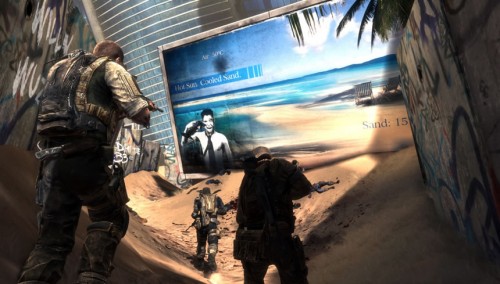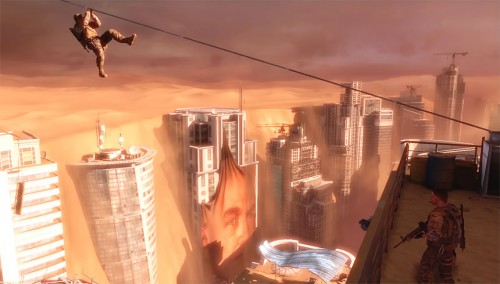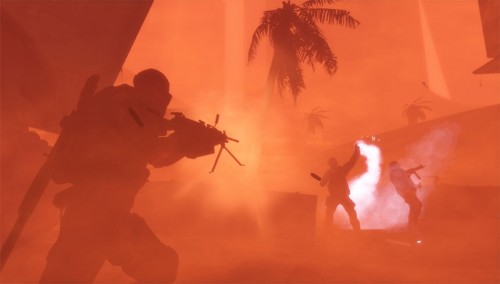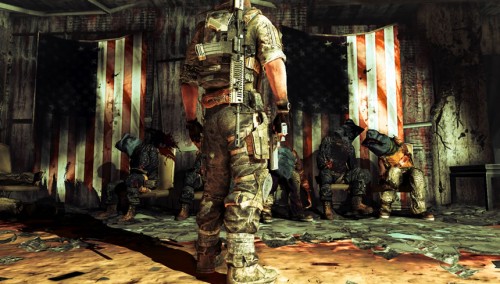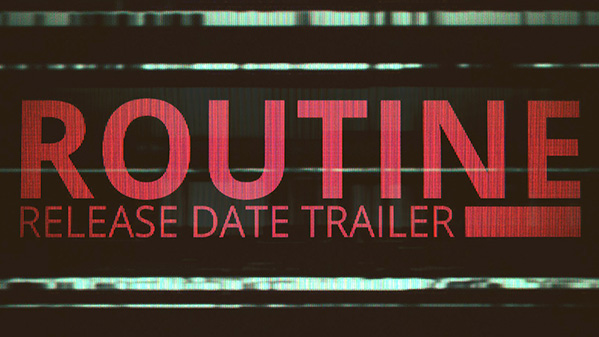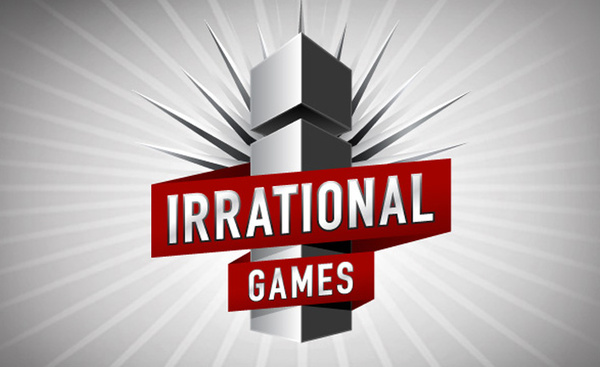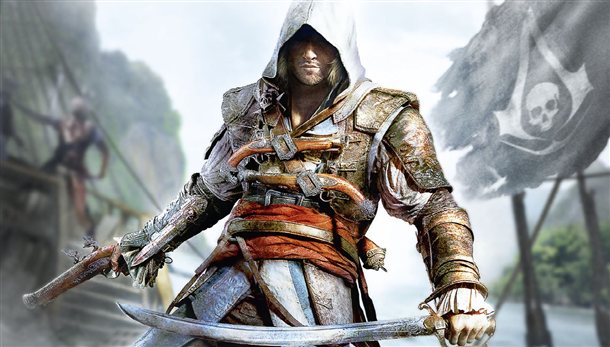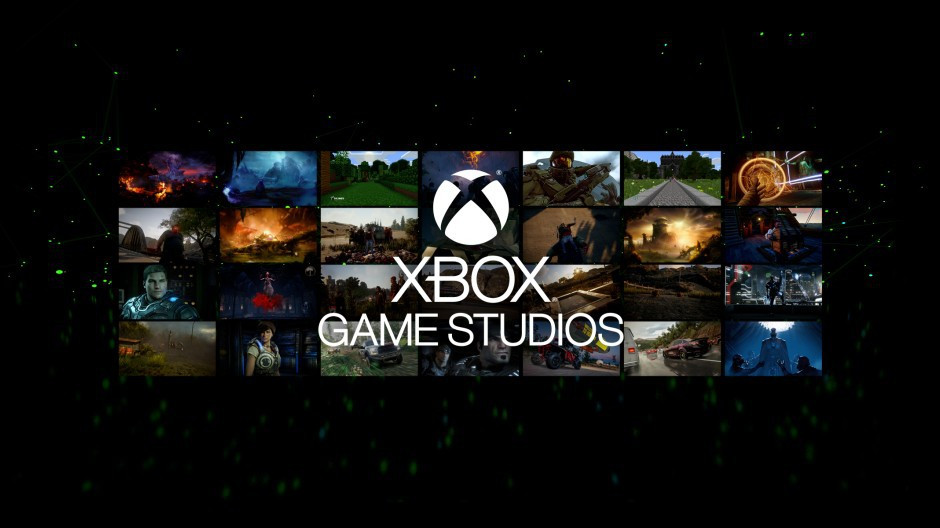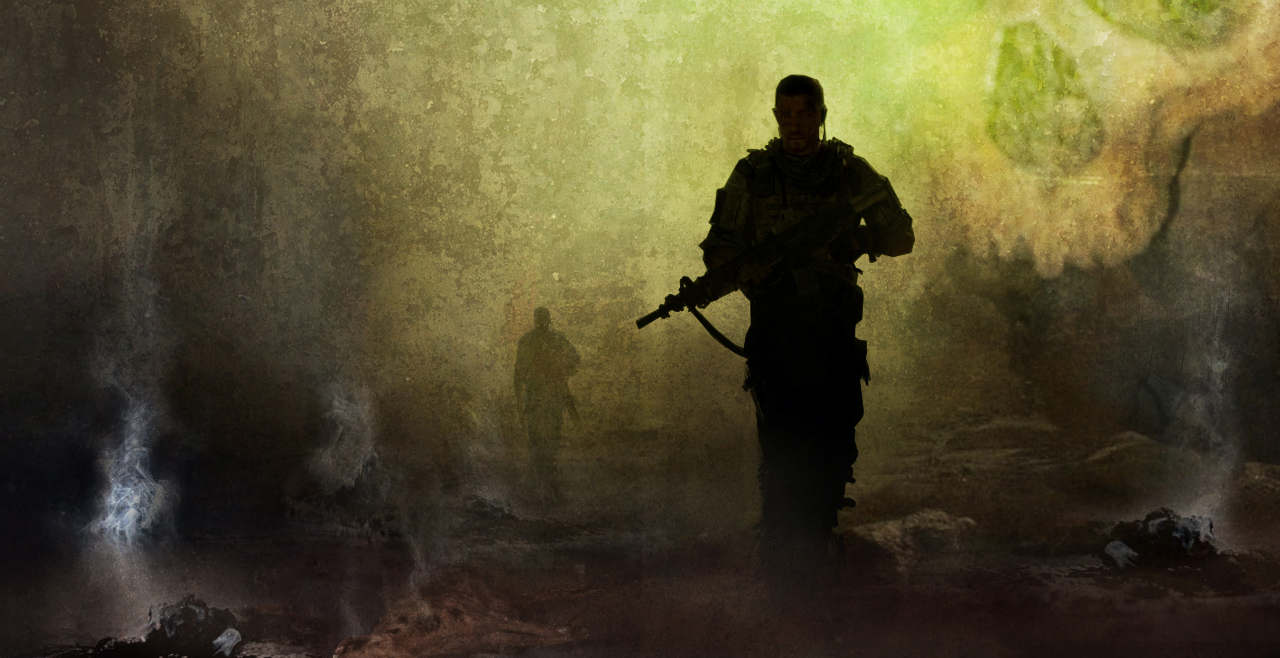
We go through the same routine every generation. Expensive production budgets and unmatchable marketing campaigns open the floodgates to blockbuster franchises stealing the spotlight from lesser known titles. We’re taught to believe that if you haven’t heard of it, it doesn’t matter. Out of sight, out of mind. But as anybody freely dabbling in the broad range of games available will tell you, this belief simply isn’t fair. Though usually a little rough around the edges, these arguably ‘niche’ games and lower ruck franchises time and time again prove to be a source of originality and entertainment. This is truthful even when these games adopt similar mechanics and design philosophies to the big boys. In fact, we saw such a case earlier this year, as cover based third person shooter Binary Domain quickly garnered cult status among a feverish fan base. Shame it sold so poorly.
Midway through the year we have another third person shooter trying the same thing. Spec Ops: The Line, a modern military themed shooter from Yager Development (Yager for the original Xbox), cleverly bait-and-switches the usual all-Americana Muslim/Russian killing war simulation for a haunting psychological thriller drawing inspiration from ‘war is hell’ narratives Heart of Darkness and Apocalypse Now. It’s a story not of warfare, but the weight of war itself, and the toll it takes upon the individuals sent to wage it.
On paper, Spec Ops: The Line is a tantalising recipe for a unique take on a tired genre. And after many hours of play, I wish I could lavish in such sentiments. Instead, once the credits were rolling, I felt underwhelmed and frustrated. Underwhelmed at the overly safe and simplistic game design, and frustrated at a fumbled narrative that should have been so much more.
To understand where Spec Ops went wrong, one must understand what Spec Ops did right. Straight out of the gate the game appears to be ticking the correct boxes, mostly thanks to an interesting plot hook. In the not-too-distant future, the emirate of Dubai is ravished by the worst sand storm in recorded history, leaving the city devastated and the civilian population in dire need of aid. Answering the call was Colonel John Konrad, commander of “The Damned” 33rd Battalion unit, whom steers his post-Afghanistan war unit to Dubai to initiate an evacuation, despite being ordered by the US to do otherwise. The fate of Konrad, The Damned, and the population of Dubai remains unknown, as the unit inexplicably disappeared off the grid. Until now.
Spec Ops does not have you play as Konrad, but instead one Captain Martin Walker. After the US Army picks up a looped radio broadcast recorded by Konrad, emphasising the failure of the evacuation and civilian death toll, Walker and his two squadmates, Sergent Lugo and Lieutenant Adams, are tasked with entering Dubai to find out what happened to the team. Naturally, what should be a quick and easy mission is everything but, and instead we embark on a journey into the horrors of war and a soldier’s psyche.
Emphasis is on the latter. Spec Ops asks us to fully embody Captain Walker, and to experience what he experience. This is both Spec Ops‘ best strength and greatest flaw. Through a clever narrative, backed by chatty squadmate commentary and contextually accurate dialogue, players are put face to face with the most confronting images of war. And in many cases you are involved these horrors, as the game throws legitimately morally grey conundrums and confronting imagery at your feet. At its best, Spec Ops plays on the tropes of pro-military murder simulator video gaming, toying with player expectations through the grim reality of what war really is. One of my favourite moments is early on, where Walker and co engage in combat with remnants of The Damned 33rd unit. Walker barks loudly that they’re ‘friendlies’, yet a distressed and confused American ‘enemy’ continues to lay down fire. Walker and his squad are forced to engage in a chaotic battle simply for survival, and the stress of engaging a what should have been an ally evident among the squad in the battle’s aftermath. Snippets of brilliance just like this are scattered throughout the entire game, forcing players to question the merit of their mission and how FUBAR’d the situation has become.
These glints of brilliant story telling are let down by what I felt was a considerable disconnect between the character that is Walker and…me. The player. The person engaging in this experience. Too often I felt the narrative polarise itself between involving me in the experience with clever encounters (as mentioned above) and challenging morally grey problems where they’re seems no good solution, and a game telling me how to feel and react. In a story all about the inner workings of a soldiers psyche and brutality of conflict, one where the effectiveness of twists and potent imagery hinge entirely on the believability and personalisation of the story, this is seriously problematic.
One of the most poignant and defining moments in the narrative is a great example of this flawed story telling. It’s hard to describe the event without blatant spoilers, so I’ll try to keep it simple. The player is asked to do something, and that something is going to be pretty brutal. The player has no choice but to do it. While engaging in this activity, a likely consequence of continued behaviour presents itself. This consequence will be undeniably negative. Though there is still time to stop, the player is given no option but to finish. The earlier, predictable consequences come to fruition through graphic imagery, and we’re supposed to feel the weight of our mistake. Only I couldn’t, because I knew what was going to happen and was frustrated at the inability to avoid it.
Instead of throwing the player into ‘all or nothing’ situations where there appears to be no better options (even if the player could make them), situations like this force the player to behave a particular way for no other reason than to push the story forward. In my head, the player’s brain, I know there might be alternatives, but the game disallows them. I’m reminded that I’m playing just that: a video game. A video game that I am not a part of. It’s all fake, scripted, and disconnected from reality. Walker is an avatar I’m supposed to vicariously experience this world through, yet by forcing me to behave a certain way I’m disconnected from the experience. I am no longer Walker. Walker is a separate entity, one acting independently of me, and thus the weight of consequences from his unnecessarily poor decision making significantly lessens.
A narrative like this would be fine if it were consistent, but Spec Ops is not, and that’s the problem. Spec Ops insists on involving the player in difficult decision making at one moment, then forcing them to play by arbitrary rules the next. Walker is us, then he is somebody else. The schizophrenic story telling continues right up through the game’s ‘reveal all’ final, where the psyche of a war weary soldier is unravelled. A clever narrative would have such a climax deconstruct the futility of perceived control and player decision making through interactivity, or simply serve as a bookend to an independent, cinematically driven story. Spec Ops tries to do both, and in both cases misses the marks.
Frustrations with the narrative might be forgivable if Spec Ops was an interesting game to play, but sadly it’s not. And again, this is a case of missed potential. There’s little inherently wrong with Spec Ops‘ gameplay. Controls are simple to learn and responsive. Aiming is not a problem, if a little floaty, and enemies don’t feel like bullet sponges. Of available weapons, Spec Ops is one of the few games to get the power and spread of shotguns just right. Head shots are both satisfying in terms of visual feedback, and useful in gameplay function (as they initiate brief slow mo). The simple squad control system allows for intuitive suppression commands with the press of a button.
So what’s the issue? Well, simplicity is the problem. On a mechanical level, Spec Ops is a bare bones stop-and-pop shooter, stripped of interesting mechanics and quirky gimmicks to instead focus on underlying design fundamentals. Rarely is there any depth to any encounter beyond squatting behind cover and occasionally popping out to land shots. The earlier mentioned Binary Domain strove for something different with its strategic dismemberment and outrageous boss fights. Spec Opshas none of that. Enemy types can be described as “that guy with that particular gun” and “the one with armour”. Occasionally Spec Ops aims for creative encounters, such as battling it out in a sandstorm and cracking glass to bury enemies in several tons of loose sand, but by the end of the game I had lost count of how many times my squadmates had screamed some variation of “another enemy assault incoming!”. Get used to a lot of wave fighting.
There’s just no real enduring quality to the gameplay. Not that it necessarily plays poorly, but how it plays is akin to every third person shooter you’ve played across this entire entire generation, and the basics that are there fail to live up to better shooters too.
Aside from the campaign, Spec Ops includes an online multiplayer, and it’s about what you’d expect from a game like this. Load outs, unlockable perks, and so on. It’s the single player formula compiled into a multiplayer environment. There’s some cool ideas, such as area affect perks that, in theory, encourage teamwork, though I never really experienced such behaviour online and question whether or not they’re really needed to succeed. The ability to throw rocks is a cool gimmick too, as it fools other players into believing grenades have been thrown, thus flushing them out of cover. But these gimmicks are just a companion to the basic gameplay. It’s fun, if you’re in the mood and dig the game’s formula, but again there’s no real addictive or unique quality to steer Spec Ops from other multiplayer games. Not unless you really like the formula and aim to unlock every perk.
‘Mediocrity’ is a word that swirls around my head when I think of Spec Ops: The Line, but I feel a little guilty using it as I don’t believe it’s quite accurate. Going intoSpec Ops I had no expectations, yet I left feeling disappointed. Disappointment is relative to expectations, so where did they come from? I believe they came from the better qualities of Spec Ops. The harsh war imagery, the interesting premise, the snappy dialogue, and the narrative brimming with potential. They’re all there, demanding your attention. But it’s the execution of these qualities that let me down. I so wanted to enjoy playing Spec Ops more than I did, but after several wave-based encounters the play became a grind. I wanted to engage in the narrative and embody Captain Walker, feeling his experiences as if they were my own. But the clash between player interactivity and a linear, controlled narrative disconnected me from Walker’s actions, and I too often felt like I was witnessing a game that wanted me to feel a certain way, and knew not how to make me feel that way naturally.
I admire Yager Development for their ambition in steering a shooter narrative away from the ‘dudebro’ mainstay of today. I admire them for their portrayal of war, focus on the human element, and occasionally clever narrative that plays on the best qualities of interactive story telling. But too many missteps in the story’s presentation, and an absence of enduring and original qualities to the gameplay, make for a title memorable for the wrong reasons. Worth a look for tolerant shooter fans looking for an interesting and often overlooked perspective on war, though perhaps only as a rental.
Bold war imagery | Interesting ideas | Decent soundtrack
Schizophrenic narrative | Uninspired gameplay | Bland multiplayer

